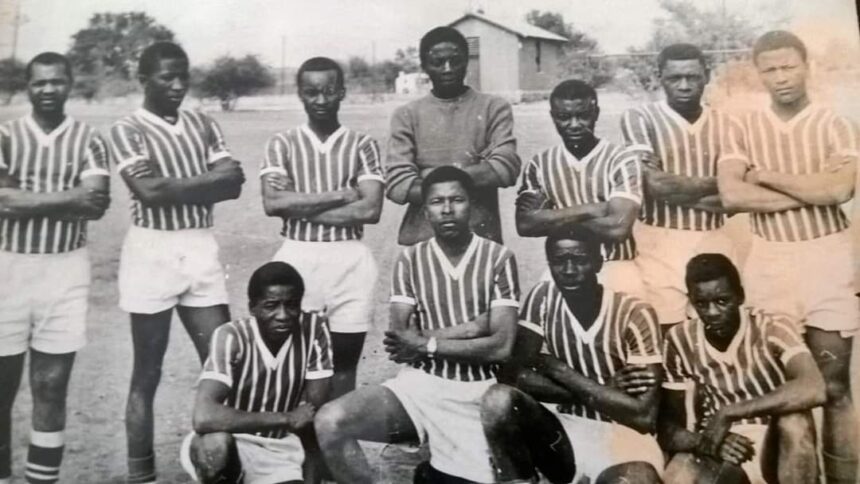Born Terence Samuel Isaacs, aka ‘Papie’, in Windhoek on the 4 February 1968, his incredible football journey was totally different from other young boys who kick-started their careers playing street football.
A proud product of Bethlehem, a slightly lesser affluent residential section holed up West of Khomasdal, specifically designed to accommodate a mixture of slightly middle-class coloureds and well-to-do ‘darkies’, young Isaacs was exposed to playing football on decent pitches.
“My broer, we were the designated unofficial residents of the nearby Augustineum High School, a stone’s throw from our house. We enjoyed unlimited access to the school’s lawn rugby field, going about our business unhindered in the afternoons after school,” he revealed with a broad smile on his face.
A copycat of his old man, Nandos, Isaacs started his elementary education at the St. Andrews Primary School in Khomasdal.
It was at the school that he got exposed to playing football in organised structures at a very tender age.
The enthusiastic school-going boys formed a team christened Eleven Tactic Boys.
The team competed fiercely in the popular stake games against boys from other primary schools in the neighbourhood.
Some of his celebrated teammates were Berty Basson, Antony Malgas, Lennert Medisson, Sakkie Mouton and Bassie English.
The name was later changed to Manchester United when the football crazy ‘Pikininis’ graduated to L. J Barnes High before ending up at the newly-built Dawid Bezuidenhout Secondary School.
“It was very fascinating watching hostel teams compete against each other in the hotly-contested inter-hostel exhibition matches. We were in absolute awe of Golden Bees, keenly following the team’s progress. Those boys played attractive football with highly gifted players in their armoury, such as Britho Shipanga, Phello Muatunga, Daddy Uushona, Riva Jakonia, Leo Koutondokwa, Dahle Stephanus, Steve Haihambo, Koko Muatunga and Sadike Gottlieb in the star-studded lineup,” he narrated.
In the interim, Isaacs and some of his classmates joined the Civics’ second strings – but as fate would have it, the boys did not have to wait long before transitioning to the first team.
Back in the day, during the Apartheid era, it was compulsory for school-leaving boys from the Coloured/Baster community to serve time in the South African armed forces before entering the job market.
This exercise opened the door for starting berths – and as they say, the rest is history.
The speedy all-rounder cemented him as a vital cog in the Civilians’ well-oiled engine room, effortlessly pulling the strings in the middle of the park for the exciting maroon and white strip youthful outfit.
Civics joined the newly-formed Central Namibia Football Association League in Khomasdal under the stewardship of steadfast community activist Bobby Sissing.
The new kid on the block wasted little time, and joined forces with the South African Council of Sport anti-Apartheid wing, paddling on the much-despised theme, ‘No Normal Sport in An Abnormal Society’.
The youthful Civilians announced their arrival on the big stage dishing out attractive one-touch football that captured the imagination of football lovers in the action-starved Khomasdal residential area.
Civics won numerous high-profile knockout cup tourneys with the silky Isaacs at the forefront of their surprise rise to stardom.
By the time Namibia finally gained her much-anticipated independence from Apartheid South Africa in 1990, it was only logical that Civics was the preferred choice from the dismantled CNFA League to be included in the country’s topflight league under the sole unified umbrella body, the Namibia Football Association.
After many scary seasons of struggles to keep their sacred premiership status intact, the Civilians established themselves as a major force to be reckoned with in domestic football, winning a few noteworthy major titles against all odds stacked against them, and overcoming dire financial challenges by the skin of their teeth.
The rejuvenated ‘Mighty Civilians’ triumphed in the Metropolitan Life Super Champion of Champions Floating Trophy final in 1995 in addition to taking custody of silver and bronze medals apiece, courtesy of runner up spot in the same competition in1996, and third place finish in the coveted Windhoek Laager NFA Cup in 1997.
In his own words, the pocket-size attacking midfielder drew inspiration from the elder brother Brian Isaacs.
He cites Blue Waters, African Stars and Chief Santos as the toughest opponents during his somewhat abruptly disrupted playing career.
Furthermore, the outspoken humorous bloke minced no words, expressing dismay at the checkered resume of domestic football.
‘The overall standard of the game has taken a slippery slope. It’s my sincere wish to witness the revival of school football to its former glory days. It is very painful watching young boys aged between 13 and 17 wandering dangerously, exposed to the evils of society because of non-existing sporting activities at their respective learning institutions.
Regrettably, the likeable speedy attacker did not stay long in the game to enjoy more success with the much-improved Civilians following the unavoidable arrival of a wealthy German migrant, the deep-pocketed Helmut Scharnowsky.
Isaacs quit playing competitive football while still at the pinnacle of his promising football career, aged 25.
He stunned the close-knit jolly Civilian followers and teammates when he suddenly announced his premature retirement immediately after getting hitched to his beautiful ‘lass’, Cillie, who swept his feet off the ground with her hypnotising looks.
The madam bore him a pair of sons.
In his parting shot, he urged potential athletes to remain disciplined and grounded, encouraging them to maintain standards of a clean life by keeping a healthy distance away from excessive ‘Jwala’ and ‘Motjies’ alike.



